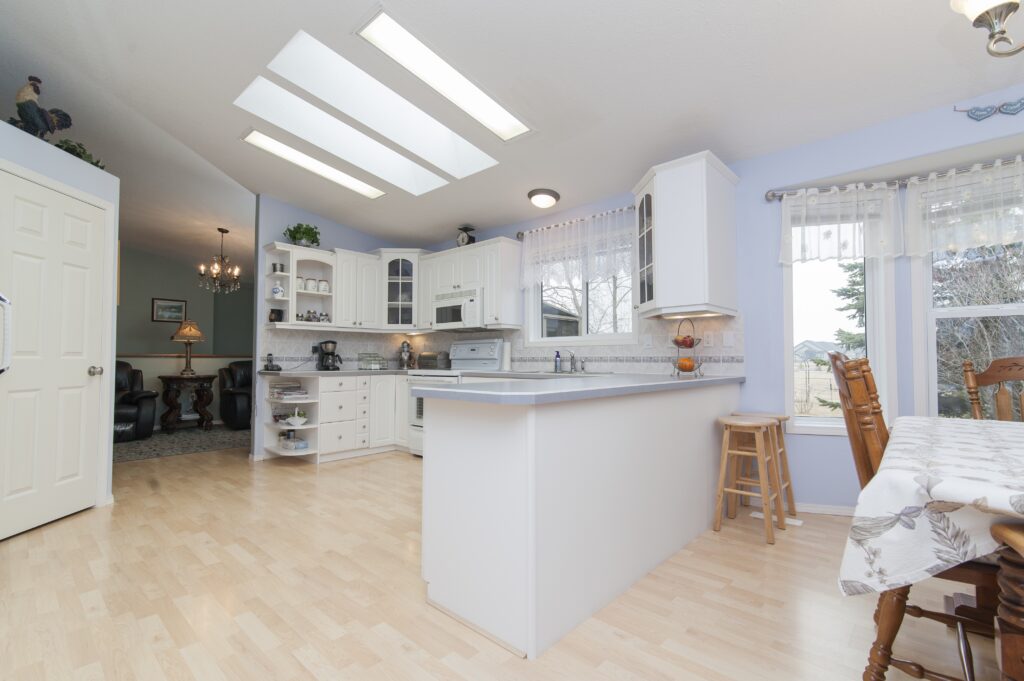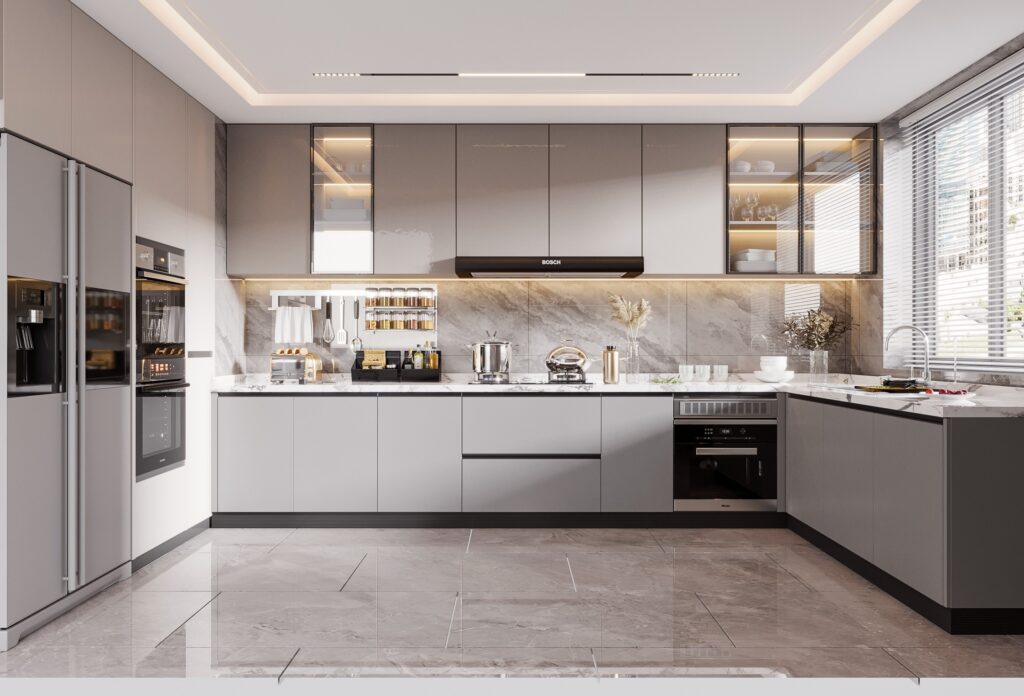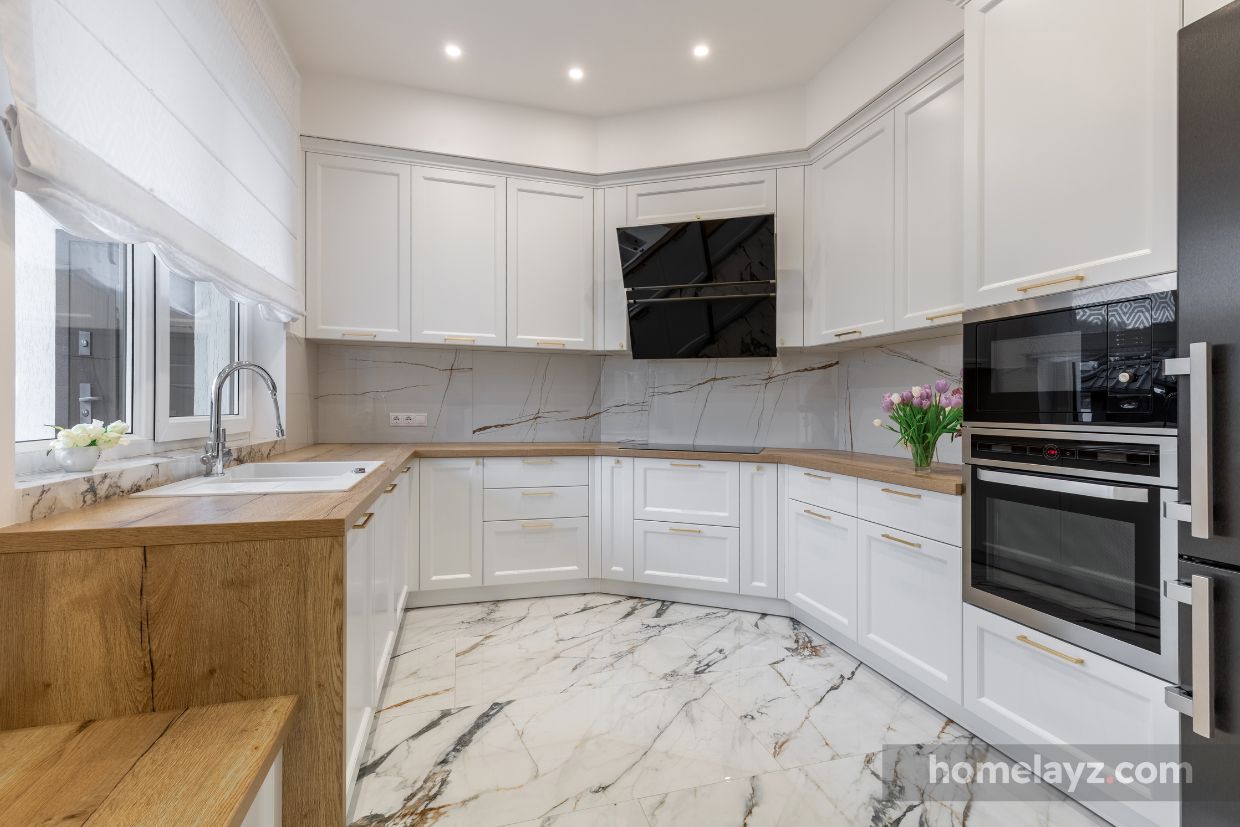Choosing the right kitchen floor can feel like a daunting task. With so many options available, how do you decide between the timeless appeal of hardwood and the durability of tile?
Your kitchen is the heart of your home, as it’s the place where you and your family come together. It deserves a floor that complements your lifestyle and enhances your space. Are you aiming for warmth and elegance, or are you more concerned about practicality and ease of maintenance?
By the end of this article, you’ll have the clarity you need to make an informed decision that suits your needs. Let’s dive in and explore which option truly deserves a place in your home.

Benefits Of Hardwood Floors
Any home looks natural with hardwood floors. They are durable. They’re popular for their welcoming look. Hardwood is broom or vacuum-cleanable. The air is cleaner since it doesn’t trap dust or allergies. It can aid allergy sufferers.
These flooring can be refinished to look new. Because they last a long time, they are a great choice for floors. Home values can rise with them. Homebuyers like hardwood floors. This classic pick never goes out of style.
Advantages Of Tile Floors
Tile floors are very strong. They can handle a lot of use. This makes them great for busy kitchens. Tile is also water-resistant. Spills are easy to clean up. Just wipe them away. Tile floors come in many colors and patterns. You can choose what you like best. They stay cool in the summer. This keeps your kitchen comfy. Tiles are also fire-resistant. They do not catch fire easily. This is safer for your home.
Tiles must little upkeep. Keep them clean by sweeping or mopping. They resist stains. They look good for years. Tile helps allergy sufferers. Dust and dirt don’t stick. Your home will have cleaner air.
Durability And Longevity
Hardwood floors can get scratches easily. They need more care and attention. When a lot of people walk on them, tiles don’t break. They are less likely to get damaged. Both floors last long with proper care. But, tiles might outlast hardwood in busy kitchens.
Water is not a friend of hardwood floors. Spills can make them warp or stain. Tiles are better with water. They resist moisture well. This makes them a good choice for kitchens. Keeping them dry helps both types last longer.
Aesthetic Appeal
Any kitchen with hardwood floors will feel warm and look classy. Everything seems fine, which makes you feel at ease. The wood grains make it look special. Every board has its own story and feel. Putting down hardwood in the kitchen can make it feel warm and welcoming.
A wide array of colors and patterns are available in tiles. They can look like stone or other things. Tiles can look cool and up-to-date. They make things look clean and smooth. This option gives you a choice and lets you make it your own. Any style or taste can be met by a variety of designs.
Maintenance And Cleaning
Hardwood floors need gentle cleaning. Use a soft broom or vacuum. Avoid water. Water can damage wood. Tiles are easier. Sweeping or vacuuming removes dust. Mopping with water is fine. Spills on tiles clean up quickly. Tiles are water-friendly.
Hardwood may need special treatment. Refinishing every few years keeps it nice. Tile is low-maintenance. Regular cleaning keeps tiles fresh. Grout might get dirty. Use grout cleaner to keep it bright. Both floors last long with care.
Cost Considerations
Hardwood floors can cost more to install. They need expert hands. Tile floors may be easier to install. Sometimes you can even DIY. Tools and materials for tile are often cheaper. Think about who will do the work. Hiring a pro costs more money. DIY might save you cash. But mistakes can add up quickly. Always plan your budget ahead. Compare quotes from different installers. This way, you get the best deal.
Hardwood floors can last many years. They may need sanding and refinishing. But they stay beautiful for decades. Tile floors are tough and strong. They resist water and stains. Little upkeep is needed. Both options add value to your home. Pick what fits your lifestyle best. You should prepare to stay in your house for a while. This helps decide the best choice. Always consider future repairs or updates.
Environmental Impact
Hardwood floors come from trees. Trees can grow back if managed well. Some trees grow fast, like bamboo. These are good for the planet. Ceramic tiles are made from clay or stone. They don’t grow back. It takes a lot of energy to make tiles.
Choose floors that help the earth. Reclaimed wood is an option. It uses old wood, not new trees. Recycled tiles use less new material. Some tiles are made from glass or metal waste. Both choices can be good for nature.
Comfort And Safety
Hardwood floors can be slippery when wet. This might cause accidents. Choosing a wood with a textured finish helps. It makes the floor less slippery. Tile floors often have a textured surface. This helps prevent slips and falls. Both options need care to stay safe.
Walking on hardwood feels warm and cozy. It is soft under your feet. This makes it nice for long cooking sessions. Tile is cool and hard. Standing for long hours might be tiring. Adding a rug can make tile floors more comfy. Both choices have pros and cons. Think about what is best for your family.
Suitability For Kitchen Environment
Tile floors handle heat very well. They don’t get damaged easily by hot pans. Hardwood may be heat-sensitive. Stains can be a problem for both. But, tiles are often easier to clean. A quick wipe can remove most marks. Some hardwoods have special coatings. These help protect against stains. Yet, they still need care.
Kitchen floors see a lot of foot traffic. Tile floors are very tough. They can handle many feet without damage. Hardwood can show wear over time. Scratches can appear on its surface. Regular care helps keep them looking nice. Some people like the look of aged hardwood.

Final Considerations
Choosing between hardwood and tile floors? Think about your lifestyle. Families with kids or pets might like tile. It’s strong and easy to clean. Tiles can be cold, though. Consider rugs for warmth.
Hardwood floors offer a warm and cozy feel. They can scratch more easily. Regular care keeps them looking good. Think about what feels right for your home.
Picking the right floor is about what you need. Do you like a modern or classic look? Tiles come in many styles. Hardwood has a timeless charm. Both choices are great. Choose what fits your life best.
Frequently Asked Questions
Is Hardwood Flooring Good For Kitchens?
Beautiful and warm, hardwood floors are a great choice. But it can get damaged by water in kitchens.
What Are The Pros Of Tile Kitchen Floors?
Tile flooring resist water and last long. They are versatile and easy to clean.
Can Hardwood Floors Handle Kitchen Spills?
Hardwood can be affected by spills. Quick cleanup is essential to prevent stains and damage.
Are Tile Floors Colder Than Hardwood?
Tile floors feel cooler underfoot. Using rugs can help add warmth and comfort.
Do Hardwood Floors Increase Home Value More Than Tiles?
Both can increase home value. Hardwood often appeals more to buyers due to its classic look.
Conclusion
Kitchen floor selection relies on your needs. Hardwood is warm and elegant. Tile is durable and cleanable. Consider lifestyle and finances. Resilient tile is popular with families. Hardwood may appeal to cozier people.
Maintenance counts. Wood is more maintenance-intensive than tile. Each has its own appeal. Consider what fits your space. Take stock of your choices. The right kitchen floor adds beauty and function. Choose happiness daily.
